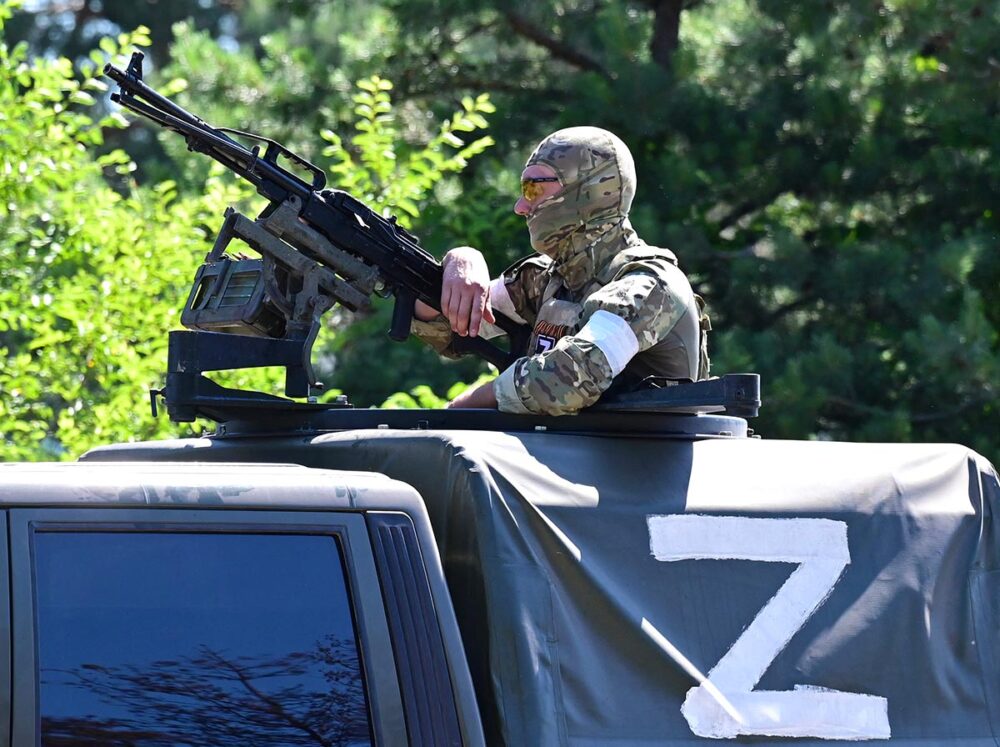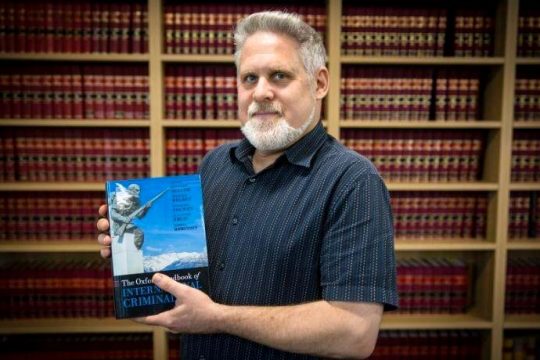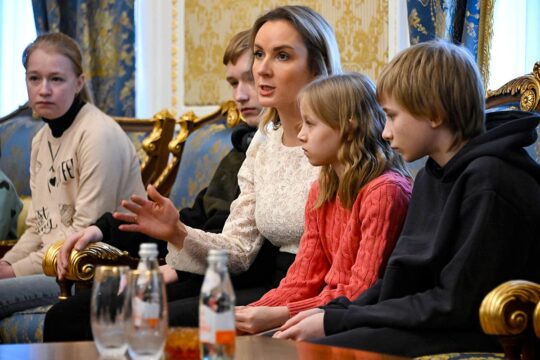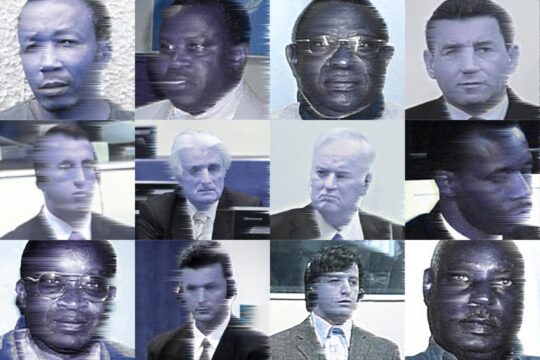On May 9, 2025, around 40 countries announced their support for the creation of a new international court to prosecute the “crime of aggression”. The court is being formed under a joint agreement between Ukraine and the Council of Europe, the continent’s top human rights organization. As its proposed statute has not yet been published, there are many elements still unclear. But multiple briefings have provided the outline: this special tribunal would target senior Russian leaders for the full-scale invasion of Ukraine since 2022, and the annexation of Ukrainian territory, including Crimea in 2014. The new court is the result of months of negotiations between members of a ‘Core Group’ of mainly European countries. Justice Info asked Marieke de Hoon, Associate Professor of International Criminal Law at the University of Amsterdam, to explain this new significant development.
JUSTICE INFO: What’s your immediate reaction to the announcement on the creation of a Crime of Aggression Tribunal through an agreement between Ukraine and the Council of Europe?
MARIEKE DE HOON: The important thing in the discussion has always been: Will this be an international court or a court based in Ukrainian jurisdiction? This is extremely important because of the immunity question. The crime of aggression is a leadership crime, which means that it is focused on those that are in power, both politically or militarily, to direct the decisions to plan and prepare and execute the crime of aggression. So, Russia’s President Vladimir Putin, Minister of Foreign Affairs Serguei Lavrov, Minister of Defence Serguei Shoigu. In particular, Putin and Lavrov would fall under the so-called ‘Head of State immunity’. Head of State immunity is recognised traditionally in international law, but arguably not in an international court. However we don’t have much case law on what the leadership criteria really is and what all preparation, planning, execution and so forth exactly mean. There are multiple leaders who have also been involved in more detailed planning of military operations that could fall under the crime of aggression. For instance, the military operation going through Belarus to attack Ukraine from there. So the question is really important whether this is going to be a national, Ukrainian court with potentially some support by some other states, or whether this is going to be an international court.
One of the Ukrainians in the negotiation told me: “It is not Ukrainian. It is created on a bilateral agreement with the Council of Europe, has an international legal personality and applies international law.” So how international would that make this court?
I think the ideal path for those that want it to be recognised as an international court – now that it is being established through a agreement between Ukraine and the Council of Europe – is, hopefully, that many other states will join this court, recognise it or become a member of it. This is also what happened with the Nuremberg Tribunal. The Nuremberg Tribunal at first was established by only four victor states, but then quickly adhered to by 19 other states and then subsequently came a UN General Assembly resolution to also recognise it. So this I think is the best path now given that it’s being established under Ukrainian law with already that regional international aura of the Council of Europe. Right now there doesn’t seem to be the required two-thirds’ majority in the UN General Assembly because Russia is an important player in the world and many states feel that this is not their war.
You said that there’s no case law but Ukraine has been conducting aggression prosecutions, and we can also look back to Nuremberg…
There is case law, particularly in Nuremberg and Tokyo. Ukraine has also been prosecuting the crime of aggression, but under a different provision than the one that is internationally recognised. I think the case law that Ukraine has developed could be useful. But the tribunal’s judges will be very careful to make it follow the internationally established understanding on the crime of aggression as much as possible, particularly to create the opportunity for other states to join and for this court to have the legitimacy as an international court.
You talked about multiple potential leaders being brought before this court, and you’ve already mentioned Belarus. Are we talking about individuals beyond the Russian leadership? Are we talking the Belarus leadership? Could we be talking about the North Korea leadership?
It will be very important to see exactly what the wording is in the Statute of the tribunal, and whether there’s language in it that makes it a Russia tribunal, so that only Russian aggressors may be prosecuted, or whether this is an ‘aggression against Ukraine’ tribunal, meaning that those that are responsible for the aggression against Ukraine can be prosecuted. That latter group would include Belarusians for sure, and potentially also North Koreans. For all of them, it’s always a leadership crime. It’s always about those that are in that position to plan, prepare, execute and so forth. It’s really important for Belarus to realise that this is not ‘complicity’, not ‘aiding and abetting’. If you look at the aggression provision of the International Criminal Court (ICC) – which is based on a 1974 General Assembly resolution in which Russia, by the way, was a very important negotiator – letting another state use your territory to commit an aggression is a full act of aggression in and of itself.
From my perspective, it feels like we’ve gone round in circles for quite some time while they’ve tried to build up some kind of political support base and discussed a lot of the details. How have we got to this decision?
It’s hard for me to say from the outside. I think the vital point has been whether it would be a Ukrainian national court or an international court. And from the get go, there were quite some severe camps that really only saw it as an ‘either/or’. And I think where the discussion has arrived creates a space in between. It is up to states to decide how international it will become and it will be up to prosecutors to then, on that basis, try to argue that the immunity of Heads of State wouldn’t apply in these particular circumstances given the amount of international support. And then it will be up to judges to decide what they feel about that argument.
I think a process was necessary. Of course, it’s too bad it’s taken some time, but it may be needed to create the space where everyone could find each other. An important aspect is that there are a couple of powerful, militarily mighty states that are very afraid that something will be created that has the universal impact of a supranational court or to criminally judge the use of force externally. Of course that’s the United States, Russia, China – but also the United Kingdom and France. They are the states that have been most vocal in this. France and the United Kingdom are member states of the International Criminal Court (ICC). In Kampala in 2010 and again in 2017 in New York during the negotiations on the activation of the crime of aggression they have really made sure that the jurisdictional reach in that court has become so very small: you also need the aggressor state to be a member state of the ICC [for the court’s jurisdiction to apply for this crime]. This was a compromise. And now you see these same states – that have a different position now that it’s about Russia – working out how to create a tribunal that wouldn’t prosecute other crimes of aggression. This has also been a really important dynamic of the discussions.
As you say, we haven’t got the actual statute yet. But what we see is that some of the biggest issues, like keeping head of state immunity, appear to have been resolved.
There’s been quite a lot of developments in the law on immunity. More and more it’s recognised that for international crimes like war crimes, those that commit them cannot hide behind the rationale of immunity. This is also a reason why hopefully the statute will be open enough for prosecutors and judges to use this court to crystallise that out.
What we understand from the briefings is that there’s a kind of a workaround whereby the prosecutor of the tribunal would be able to prepare indictments against those who would have personal immunity as head of state, head of government or foreign minister, while they’re in power, but he/she would not be able to go ahead with any trials. While others would be able to be put on trial. Does that sound rational?
That should be allowed for sure. That way you already have a dossier in case something else happens. There could be a regime change in Russia or Belarus or North Korea where a new regime might waive that immunity. Or perhaps you can issue a report that is at least an important authoritative source that can be used in history books even if there’s no prosecution.
Secondly, developments on immunity are also occurring outside of the context of this specific special court. So it’s not unlikely that maybe a decade from now immunity has crystallised further, perhaps in the context of a different situation.
You sound worried that the statute could be going backwards, if it puts into writing in some form, something that’s still dynamic at the moment.
Yes, I think it would be a pity. The crime of aggression is such a leadership crime that, of course, it’s very important to crystallise law that makes it clear that it’s not just the Putin’s and Lavrov’s of this world that are responsible, that if you are a military leader or a sub-political leader and you play an important role, you are also liable to be prosecuted. If that is the outcome of what it’s going to be, it has a lot of value. However, I do think that the crime of aggression particularly is for those that are at the absolute top. I also think that the structure of Russia is such that really Putin has a huge role here. And so it would be a distortion maybe of the storytelling, of the narrative and expressive effect of this tribunal if that particular main actor would maintain his impunity.
What about in absentia trials since that was the issue that you were briefing the Core Group on when you came to talk to them in Vilnius and you were using the example of the MH17 trial to say as long as there are safeguards in place, this is a perfectly normal way to conduct proceedings?
This is a huge accomplishment of the negotiation, because in absentia is completely normal in some states, like the Netherlands, and believed to be not totally in accordance with a fair trial in other legal systems. So a lot of the discussions have been a sharing of experiences. What’s really important is that this new court is with the Council of Europe which has the European Court of Human Rights. And the European Court of Human Rights has for decades said that in absentia trials are not a violation of fair trials if you adhere to particular procedural safeguards.
And then we’ve got the jurisdiction, which we understand is going to be based only on Ukraine’s territorial sovereignty, and that the prosecutor general of Ukraine would bring evidence to the prosecutor of special tribunal.
What’s important is territorial jurisdiction. Ukraine allows that because the aggression was committed on their territory. Then there needs to be ways to share evidence. Evidence that Ukraine holds in its national system and needs to be able to share with this tribunal. And evidence that will be shared by other states. This is why the International Centre for the Prosecution of the Crime of Aggression [The ICPA was set up 2 years ago in The Hague by a number of states including Ukraine], is going to be very important. This cooperation has already started in the ICPA to investigate, create dossiers and get information, intelligence from the various countries and entities that were involved. That can be transferred to this special tribunal so that they don’t have to start all over and they don’t have to just rely on what Ukraine has been able to gather. Although what we learned from the MH17 trial, is that Ukraine is very, very capable, especially their intelligence, in gathering all sorts of evidence that you need. The important evidence in Putin’s case is going to be very easy because it’s clear that he’s in power, and he has said a lot of things. But what’s going to be interesting is the amount of intelligence that Ukraine and states were able to share on particular other leaders that have organised, planned, prepared, executed particular military operations that were important enough to fall under the crime of aggression scope.
You’ve mentioned the ICPA, but you’ve also mentioned the International Criminal Court, which has the crime of aggression on its books in a very limited form. So how do you see this new tribunal sort of fitting in with what is already there at the ICC, which already has arrest warrants out for Putin and for Shoigu?
I see this as completely complementary and not at all as a rival court or a competition. That’s really misunderstanding how these actors collaborate together. This comes from a realisation that the ICC is unable to do something. It’s also important to continue the discussions on re-opening the Crime of Aggression Amendment [at the ICC]. I think that’s really difficult, but maybe after this Crime of Aggression Tribunal there will be a new wind, new possibilities.
The Core Group was mainly European and they never managed to get any African states. They did manage to get Costa Rica on board, but even though we accept that Ukraine is in Europe and therefore it is a European problem it does feel still like a Global North sort of tribunal, doesn’t it?
This is hugely regrettable, but definitely related to what has happened in the negotiations at the ICC towards the aggression amendment in Kampala. African states, Latin American states, Asian states feel it’s not their war. They also rightly point out that Europe has not always played very helpful roles in their conflicts. so part of what is happening is that dynamic. African states and also Latin American states were leading the discussion saying that the crime of aggression needed to be a full crime as all the other crimes. They were vehemently opposed to the results that were pushed by these powerful Western states. And so for these states to then ask for Africa and Latin American states to help them out is seen as quite hypocritical, and I understand that. It’s very important to try and recognise this past and to try and use this development as maybe a new step towards a more universal understanding rather than very power state-dominated approach to the crime of aggression.
Finally, we’re at a very specific stage in potentially ending hostilities – whether there’s going to be a 30-day ceasefire or some kind of negotiation and so on. Do you think it’s guaranteed that this tribunal process will go ahead? Or do you think it’s a possibility that we might end up with saying, okay, this one element would be sacrificed in the interests of peace?
You never know. For Ukraine, this is really important. But also in the international community there are those that have been fighting for the crime of aggression for decades. The only international prosecutions of the crime of aggression took place just after the Second World War. Since then, we’ve seen another 80 years of negotiating towards the crime of aggression definition. We see there is a lot of aggression, first of all by Russia, but not only by Russia. That norm of territorial integrity and the connected collective security system is really crumbling if it’s not already almost non-existent. So the stakes are high. We cannot let this Russian aggression go without any prosecution, without any sort of confirming the norms because I think everyone realises that especially at this time, that means not just sacrificing Ukraine’s recognition for this particular aggression, but also the ability to uphold or to try and revive territorial integrity as such.








